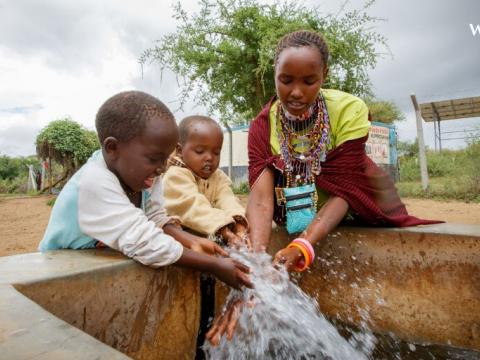Water Is Sacred

“I was thirsty”
I sip on a glass of water to satisfy my own thirst, as I reflect on Jesus’ words in Durban, South Africa from the scene of judgement. The water I drink comes from the tap in our church house that is supplied by the local municipality. It is a privilege to easily access clean drinking water. This is certainly not the experience for many South Africans. Currently, some parts of the country are experiencing critical drought conditions and water restrictions are in place.
How we could ensure that we all can have “something to drink?”. Jesus tells us that in giving water to those who are thirsty we are giving water to Jesus.
When I reflect on water in my country, with its history of colonialism and apartheid, many people were alienated from the land and its natural resources, including water. This severely affected water supply to the majority of people. While this legacy of unequal access to water is being addressed, for many people, accessing drinking water requires paying a high price or taking a long walk to fetch it. And even then, it may not be clean.
For children, the situation is critical. Nearly 1,000 children under age 5 die every day from diarrhea caused by contaminated water, poor sanitation, and improper hygiene. They are more vulnerable to harmful contaminants because their bodies are still growing. And dehydration in children may irreversibly hinder their physical and mental development.
But those who have it, tend to take it for granted. Inevitably, we waste water. We misuse water. We pollute rivers, dams and wetlands. We destroy water. And the most vulnerable parts of creation, including children, suffer the most.Many go thirsty because of our attitude towards water and our behaviour. What can we do?
Lent provides an opportunity for reflection, and for reviewing and changing our behaviour. Let us consider how we may act with compassion towards all, especially children, who lack water.
Let us rethink the nature of water. From the biblical books of Genesis to Revelation, water, like land, is a gift and a blessing. In his encounter with the Samaritan woman at the well, recorded in John chapter 4, Jesus expressed his own thirst - as he was later to do on the cross - and offered living water.
Water is sacred. Use it responsibly. Harvest rain water. Re-use water. Every drop counts.
Let us affirm the right to water as a human right. Let us work for water justice – for a world in which there is sufficient water for all: a world in which inequality is overcome, poverty eradicated and people have a greater say in the access to and distribution of water. Let us also work to change the destructive economic systems that perpetuate injustice, ensure ecological destruction and accelerate climate change.
Finally, let us celebrate the life-giving and thirst quenching qualities of water. On Mar 22, World Water Day, may be one such occasion.
Revd Dr Andrew Warmback is rector of St Paul’s Anglican Church, Durban, and author of The Church and Ecological Justice (Cluster Publications, Pietermaritzburg, 2017)